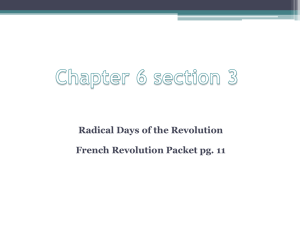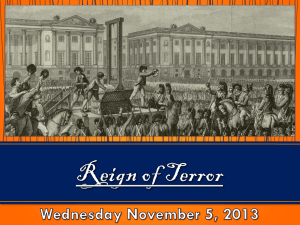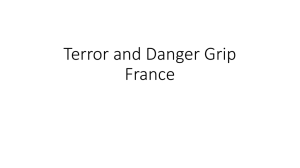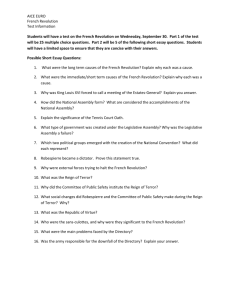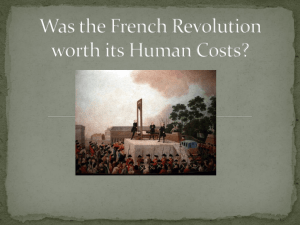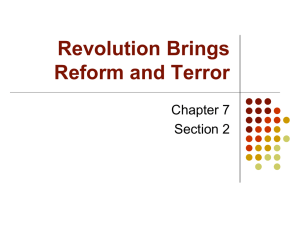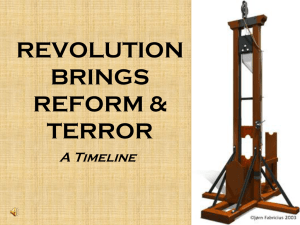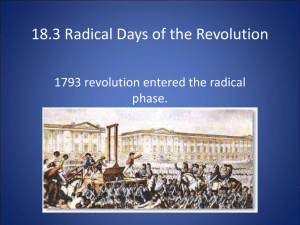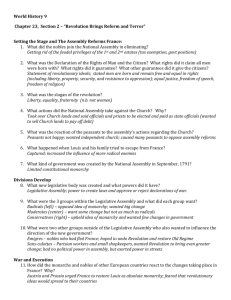The REIGN of TERROR
advertisement
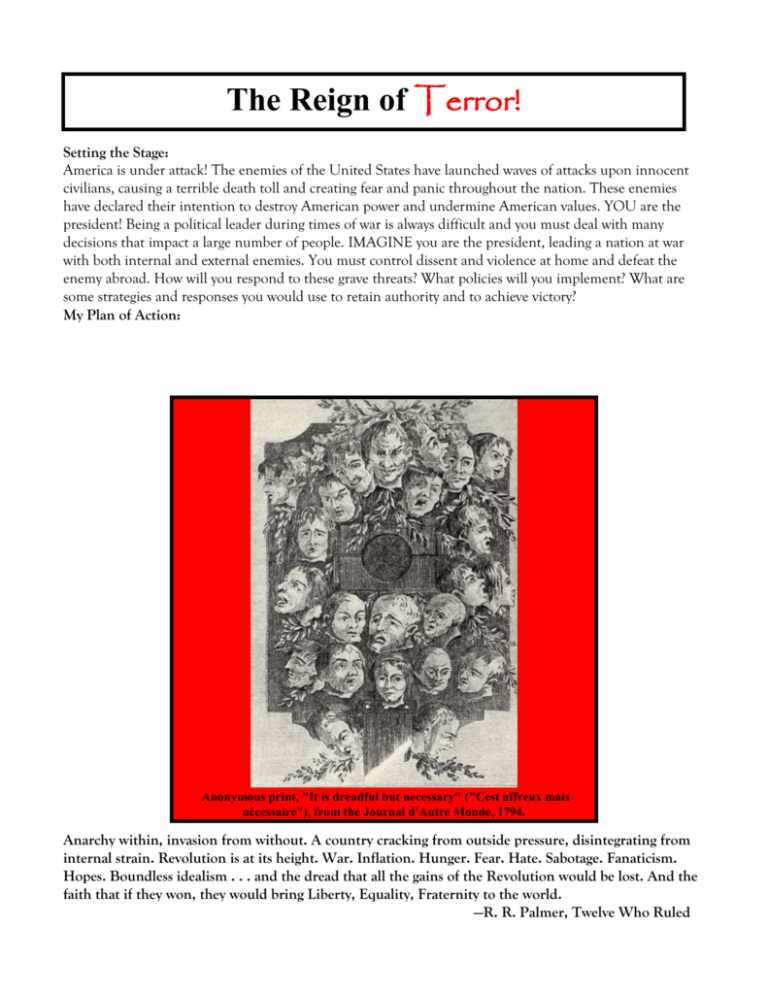
The Reign of Terror! Setting the Stage: America is under attack! The enemies of the United States have launched waves of attacks upon innocent civilians, causing a terrible death toll and creating fear and panic throughout the nation. These enemies have declared their intention to destroy American power and undermine American values. YOU are the president! Being a political leader during times of war is always difficult and you must deal with many decisions that impact a large number of people. IMAGINE you are the president, leading a nation at war with both internal and external enemies. You must control dissent and violence at home and defeat the enemy abroad. How will you respond to these grave threats? What policies will you implement? What are some strategies and responses you would use to retain authority and to achieve victory? My Plan of Action: Anonymous print, "It is dreadful but necessary" ("Cest affreux mais nécessaire"), from the Journal d'Autre Monde, 1794. Anarchy within, invasion from without. A country cracking from outside pressure, disintegrating from internal strain. Revolution is at its height. War. Inflation. Hunger. Fear. Hate. Sabotage. Fanaticism. Hopes. Boundless idealism . . . and the dread that all the gains of the Revolution would be lost. And the faith that if they won, they would bring Liberty, Equality, Fraternity to the world. —R. R. Palmer, Twelve Who Ruled Following the execution of King Louis XVI, the National Convention argued about how the country should be run and how the war should be fought. Two groups emerged: Jacobins “We must suspend free speech and liberty so we can win the war. Otherwise, there will be nothing left to defend.” Summarize this quote: (what were the Jacobins’ main goals?) Girondins “We must preserve the ideals of free speech and liberty at all costs. Otherwise, the French Revolution is not worth fighting for.” Summarize this quote: (what were the Girondins’ main goals?) Which of these two plans is similar to your “plan of action” from the introductory activity? The Terror was designed to fight the enemies of the revolution, to prevent the success of counterrevolutions within France, especially in the city of Lyon and in the West of France, in a region called the Vendée. In certain regions, men and women armed themselves to overthrow the republic and restore the monarchy. Some counter-revolutionaries were peasants, others sharecroppers, still others, textile workers. Counter-revolutionaries in the Vendée seemed particularly upset that Robespierre had launched a movement of dechristianization and had seemingly gone on a witchhunt against priests. Most of the people rounded up were not aristocrats, but ordinary people. A man (and possibly his family) might go to the guillotine for criticizing the revolutionary government. If an informer happened to overhear, that was all the tribunal needed. Watch Committees around the nation were encouraged to arrest "suspected persons,...those who, either by their conduct or their relationships, by their remarks or by their writing, are shown to be partisans of tyranny and federalism and enemies of liberty" (Law of Suspects, 1793). Civil liberties were suspended. The Convention ordered that "if material or moral proof exists, independently of the evidence of witnesses, the latter will not be heard, unless this formality should appear necessary, either to discover accomplices or for other important reasons concerning the public interest." The promises of the Declaration of the Rights of Man were forgotten. Terror was the order of the day. In the words of Maximilien Robespierre, "Softness to traitors will destroy us all." Questions: 1. Who was impacted by Jacobin policies? 2. Which group was targeted more than others? A description of The Terror at Bordeaux. “A Woman was charged with the crime of having wept at her husband’s execution…she was condemned to sit for hours under the blade which shed upon her, drop by drop the blood of her dead husband…before she was released by death…” Jean-Baptiste Henry A journeyman tailor, aged 18, was convicted of sawing down a tree of liberty. Executed September 6, 1793. Francis Bertrand Aged thirty-seven, convicted of producing “sour wine injurious to the health of citizens,” guillotined. 1819 - Caricature by Englishman George Cruikshank. Titled: "The Radical's Arms”. "No God! No Religion! No King! No Constitution!" is written in the republican banner. The three sources above show examples of individual cases where innocent French people were put to death unnecessarily. Look at the caricature above, what is it trying to say about this “enlightened” form of execution? Give specific examples to support your answer. Why would the British press characterize the Radicals in this way? Robespierre’s words… “If the spring of popular government in time of peace is virtue, the springs of popular government in revolution are at once virtue and terror: virtue, without which terror is fatal; terror, without which virtue is powerless. Terror is nothing other than justice, prompt, severe, inflexible...It has been said that terror is the principle of despotic government. Does your government therefore resemble despotism? Yes, as the sword that gleams in the hands of the heroes of liberty resembles that with which the henchmen of tyranny are armed.” Speech on the Justification of the Use of Terror “The people want what is good, but they do not always see it.” On the eve of Robespierre’s ascension to power, he had drafted a personal revolutionary catechism: What is our aim? It is the use of the constitution for the benefit of the people. Who is likely to oppose us? The rich and the corrupt. What methods will they employ? Slander and hypocrisy. What factors will encourage the use of such means? The ignorance of the sans-culottes. (The people must therefore be instructed). What are the obstacles to their enlightenment? The paid journalists who mislead the people everyday by shameless distortions. What conclusion follows? That we ought to proscribe these writers as the most dangerous enemies of the country and to circulate an abundance of good literature. What other obstacles are there to the achievement of freedom? The war at home and abroad. By what means can the foreign war be ended? By placing republican generals at the head of our armies and by punishing those who have betrayed us. How can we end the civil war? By punishing traitors and conspirators…by sending patriot troops under patriot leaders to cut down the aristocrats of Lyon, Marseille, Toulon, the Vendee, the Jura, and all other districts where the banner of royalism and rebellion has been raised; and by making a terrible example of all the criminals who have outraged liberty and spilled the blood of patriots. 3. How does Robespierre justify the power of the State? 4. Who does Robespierre consider “enemies of the state” and what does he believe should be done with these traitors? “…a bloodthirsty charlatan, without talent and courage, called Robespierre, made all the citizens tremble under his tyranny.” “Robespierre is extremely touchy and suspicious” (mayor of Paris, 1791) “…dictatorship…he believed was the only way to stop the spread of evil.” (Bertrand Barere, 1832 – he sat on Committee with Robespierre) “The bastard isn’t satisfied with being the boss, he’s got to be God as well.” (a sansculottes) “I would have given my life to save Robespierre, whom I loved like a brother. No one knows better than I do how sincere, disinterested, and absolute his devotion to the Republic was. He has become the scapegoat of all the revolutionists; but he was the best man of them all.” (friend of Robespierre) “Robespierre had argued consistently since 1789 that in a time of revolution, the end justifies the means, and even his advocates have to acknowledge that he did not flinch from the bloodiest implications of his position.” (Historian, Ruth Scurr) The Lessons of the Reign of Terror Within a two year period, a relatively small handful of revolutionary leaders commandeered the Revolution. They did so by eliminating opposition groups, often using mob violence while appealing to the ideal that the Revolution demanded the sacrifice of individualism for the good of society. Once the mob had served its purpose, its leaders too were executed; victims of their own terror. In many ways, the Reign of Terror is a case study in obtaining and maintaining absolute power. Execution of Robespierre Questions: 1. Does the “end justify the means?” 2. Did the Republic achieve its goals? Explain your answer, a simple ‘yes’ or ‘no’ is not acceptable. Writing Assignment: Robespierre…“bloodthirsty charlatan” or “defender of the Republic?” Is a government ever justified in using violence against those it identifies as a hostile threat to the State? Who gets to decide? Write an essay that addresses the question above, using Robespierre as your example. Step 1: Choose a side – are you “for” Robespierre or “against” Robespierre? Step 2: Once you’ve chosen your side, go back through the readings, and choose the sources that help your argument (this is your evidence). Step 3: Don’t forget that your introductory paragraph needs a strong THESIS! (The intro and thesis should focus on whether you are “for” or “against” Robespierre, as well as giving an answer to the questions above). Step 4: Explain how your evidence supports your thesis. Sources used: http://www.historywiz.com/terror.htm http://french-history.suite101.com/article.cfm/the_reign_of_terror_in_the_french_revolution http://www.mtholyoke.edu/courses/rschwart/hist255/kat_anna/terror.html http://faculty.fullerton.edu/nfitch/history110b/rev.html McDougal, Little – Modern World History: Patterns of Interaction Textbook Scurr, Ruth. Fatal Purity. Henry Holt and Company: New York, 2006.
